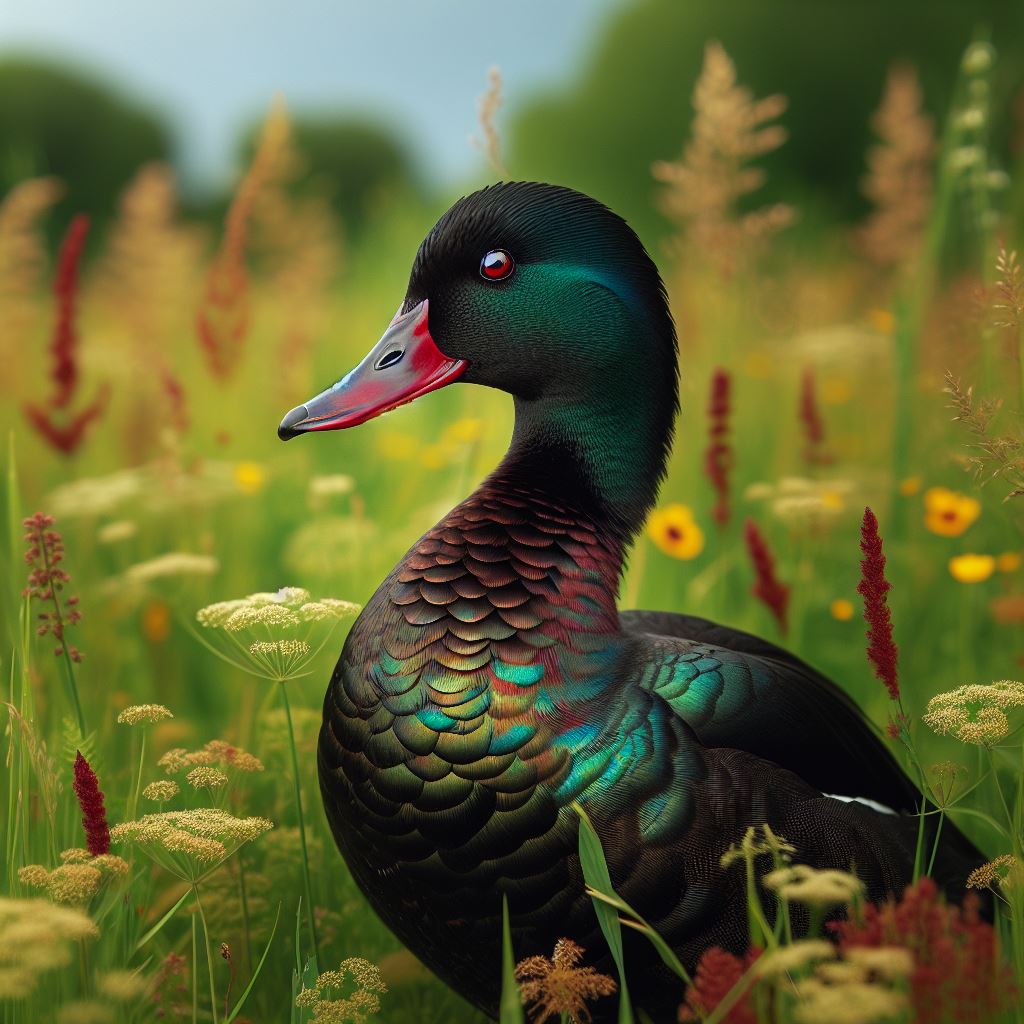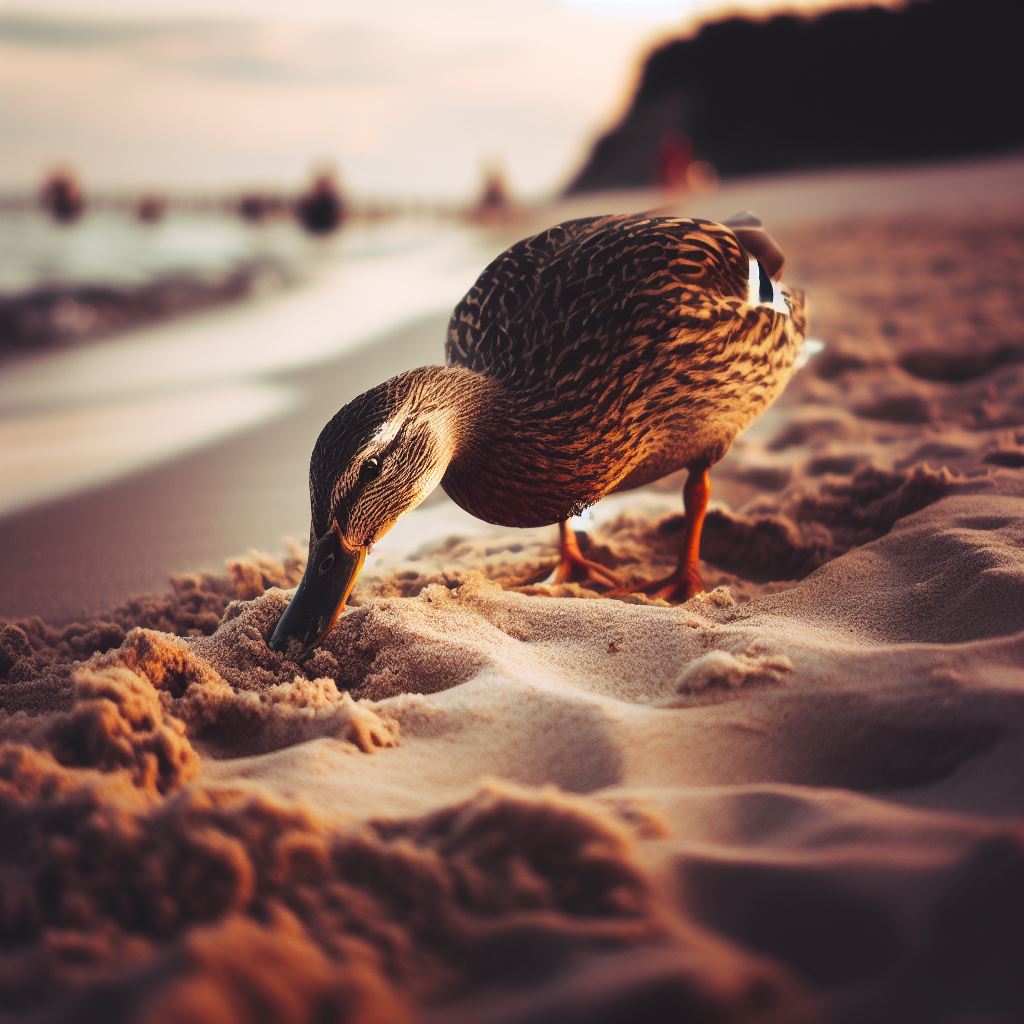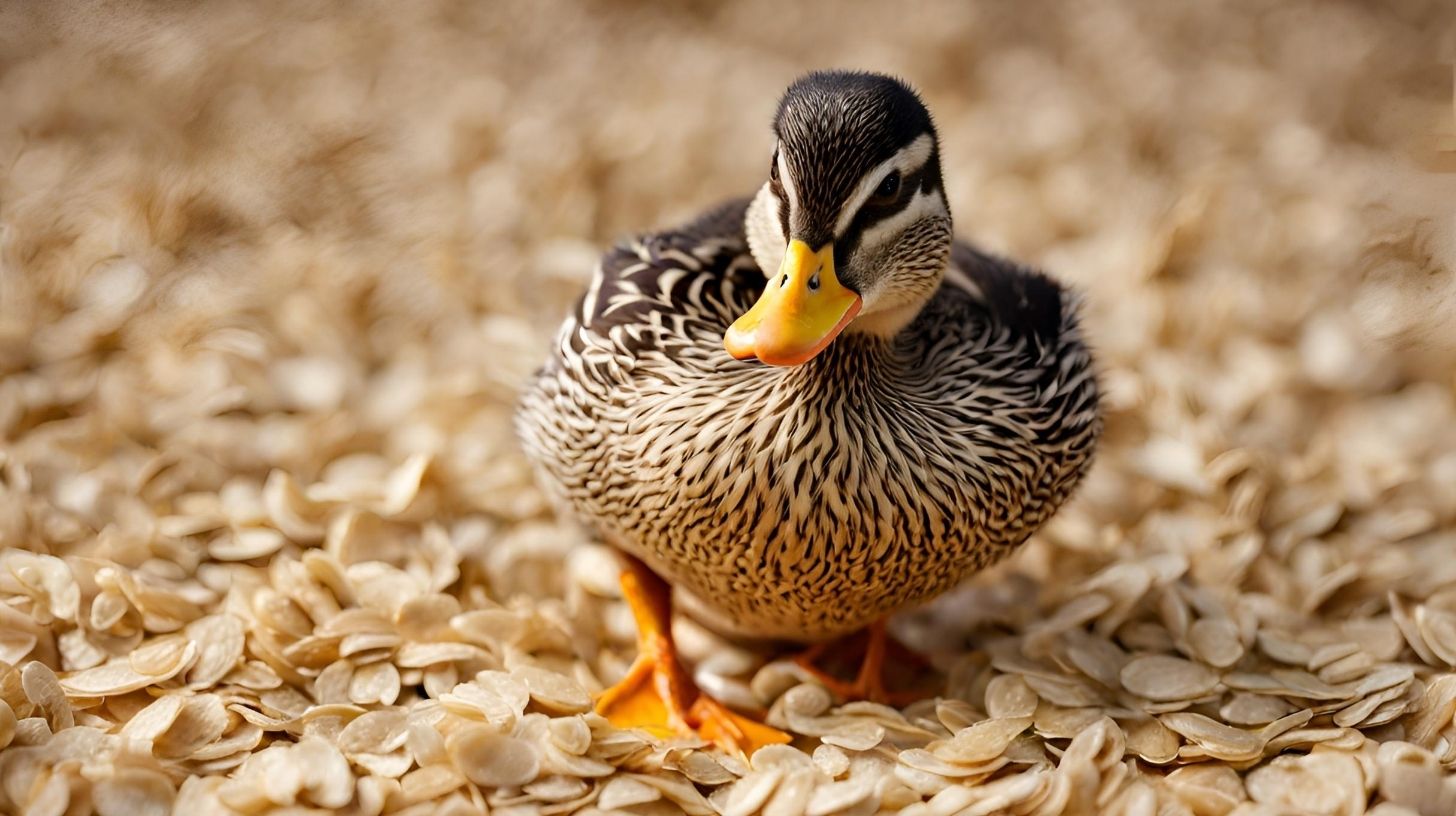Can Ducks Eat Spaghetti?
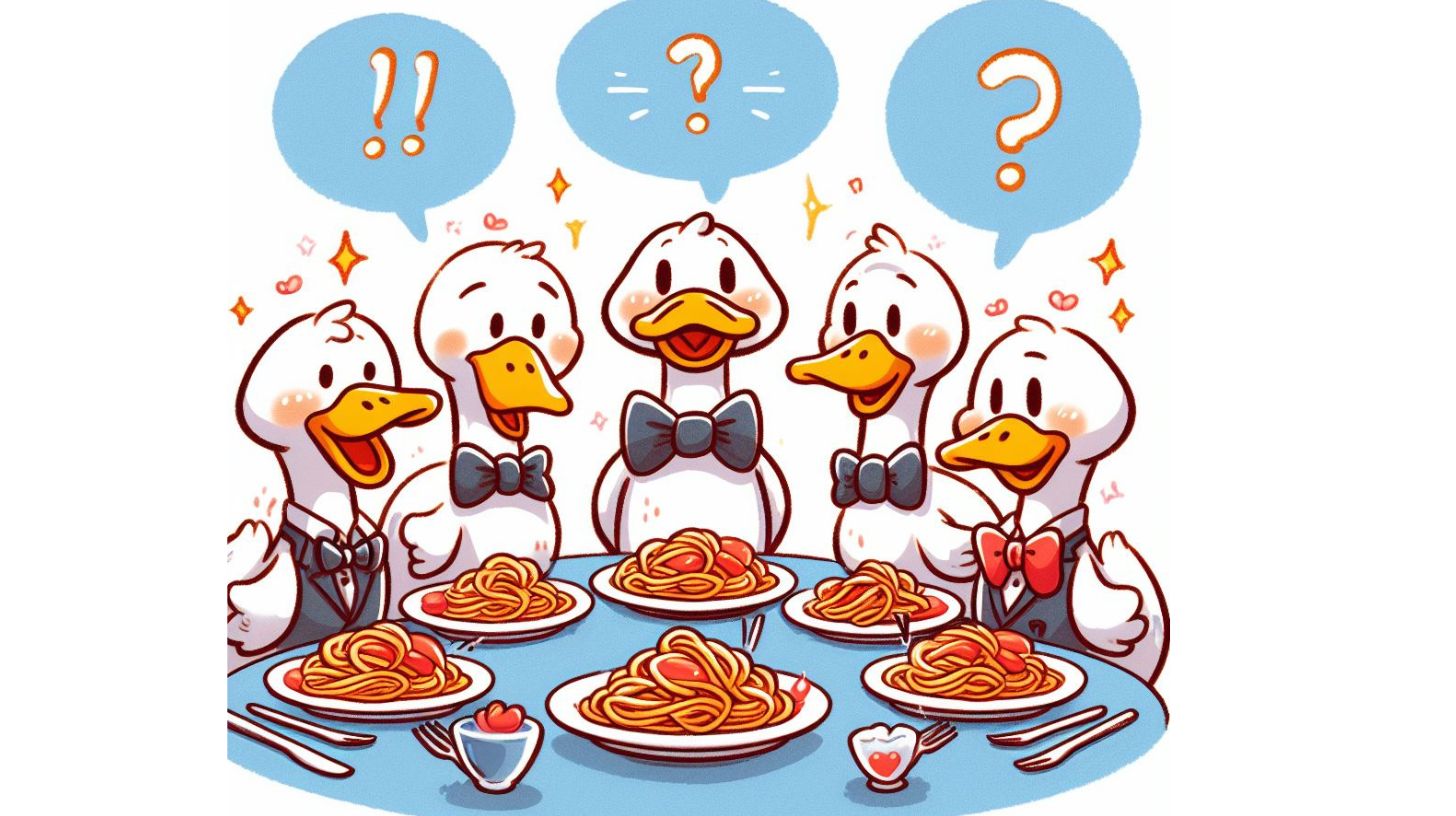
Table of content:
Can Ducks Eat Spaghetti? Yes, ducks can eat spaghetti, but it should not be a regular part of their diet. Spaghetti and other types of pasta provide little nutritional value for ducks and can even pose some health risks if fed too often.
Key Takeaways:
- Ducks can eat small amounts of cooked spaghetti and pasta occasionally as a treat.
- Spaghetti lacks key nutrients ducks need and provides mostly empty calories from carbohydrates.
- Too much spaghetti can lead to obesity and GI problems in ducks. Stick to healthier options like fresh produce, bird seed, and protein rich insects.
- Never feed ducks raw spaghetti. Make sure it is well cooked and cooled before feeding to ducks.
- Limit treats like spaghetti to once a week or less for ducks. Their main diet should be formulated for bird food.
Spaghetti is typically made from wheat flour and water, with added eggs or oil. This dough is extruded into various pasta shapes and then boiled before serving. Spaghetti itself provides little nutritional value beyond carbohydrates for energy. Ducks can digest the carbohydrates in spaghetti, as long as it is well cooked. However, spaghetti lacks the key vitamins, minerals, fat, and protein that ducks need in their diet.
Can Ducks Digest Spaghetti?
Ducks belong to a family of birds called Anatidae in the order Anseriformes. Their digestive system is adapted to their natural diet in the wild of insects, plants, seeds, and aquatic vegetation.
Ducks have a gastrointestinal (GI) tract suited to digesting high fiber foods. Their GI tract is relatively short compared to their body size, with a reduced gizzard and no crop or cecum.
Starch digestion occurs primarily in the small intestine with help from enzymes like amylase. Ducks do produce amylase and can break down starches into simple sugars. This allows them to digest and absorb some energy from the carbohydrates in cooked pasta.
However, a pasta-heavy diet provides an imbalanced nutrition profile for ducks. Pasta lacks key amino acids and is deficient in vitamins A, D, E, and K which are crucial for duck health.
Ducks also have limited ability to digest simple sugars. Too much carbohydrate from sources like pasta can overload their system. This can lead to diarrhea, intestinal upsets, and obesity over time.
Is Spaghetti Safe for Ducks to Eat?
It’s generally safe for ducks to eat small amounts of cooked spaghetti in moderation. However, there are some safety precautions to take when feeding spaghetti to ducks:
- Never feed ducks uncooked pasta or noodles. Raw spaghetti is a choking hazard and can cause intestinal blockages.
- Make sure the spaghetti is well cooked and fully cooled before feeding to ducks. Hot food can burn their throats.
- Avoid spaghetti with added salt, oils, or seasonings. Plain wheat pasta is safest.
- Rinse off any sauce residues so ducks don’t ingest too much sugar or acid from tomato sauces.
- Cut up spaghetti into bite sized pieces for easier and safer swallowing. Small pasta shapes like elbow macaroni are ideal.
- Remove any uneaten spaghetti within an hour so it doesn’t rot or attract pests.
Provided these precautions are taken, spaghetti in moderation should not pose any major health risks to ducks.
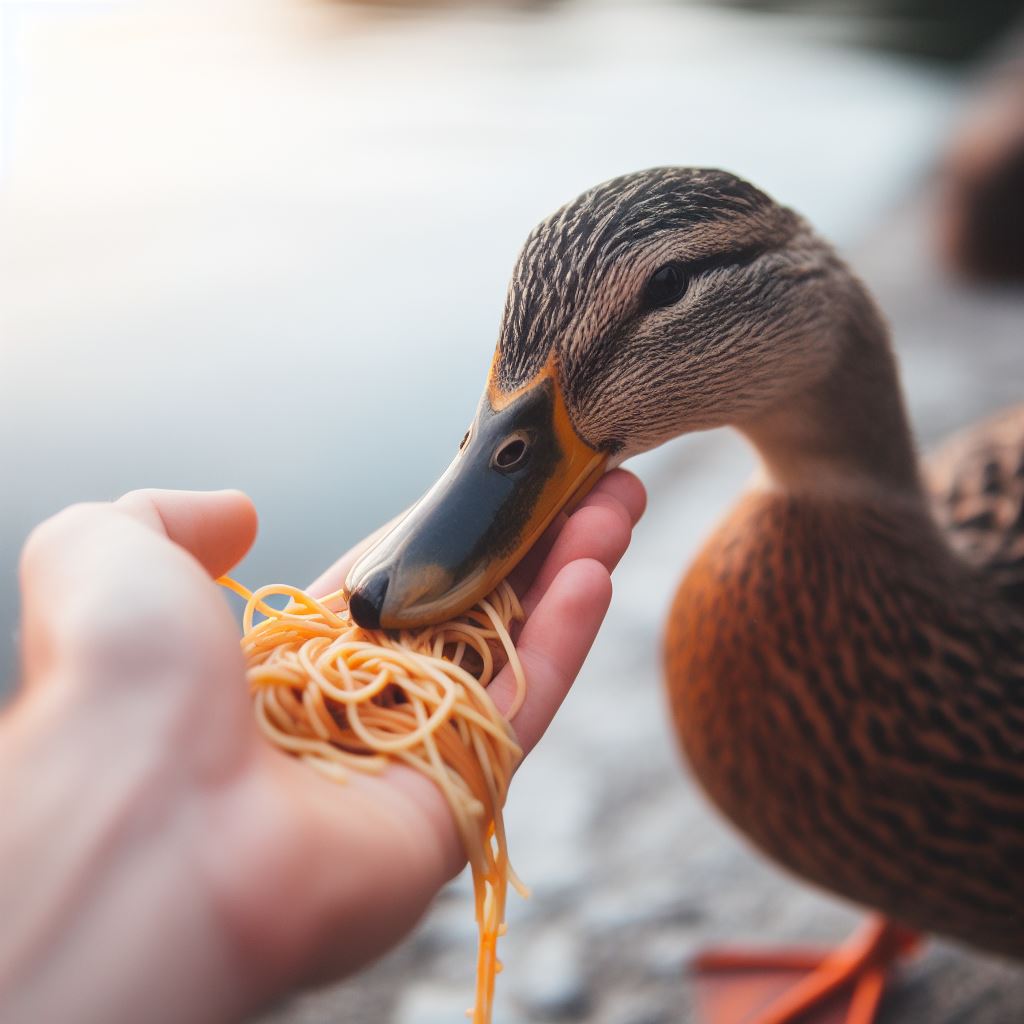 How Much Spaghetti Should Ducks Eat?
How Much Spaghetti Should Ducks Eat?
Ideally, spaghetti should make up no more than 5-10% of a duck’s diet. The bulk of their nutrition should come from formulated bird food and fresh greens.
The occasional spaghetti treat is fine, but it should be limited to no more than once a week. More than that on a regular basis can promote obesity and malnutrition.
When feeding spaghetti or pasta, the portion sizes should be small. For an average adult duck, stick to 1/4 to 1/2 cup cooked spaghetti at one meal.
This is enough to provide a taste and some energy without displacing too much of their regular diet. Monitor duck droppings after feeding spaghetti; diarrhea may be a sign they’ve had too much.
Healthier Treat Alternatives for Ducks
While ducks can eat some spaghetti, it offers minimal nutritional value. There are many healthier treat options for ducks that provide more complete nutrition:
- Fresh greens like kale, lettuce, spinach provide vitamins A, C, K, folate and fiber. Chop into duck-sized pieces.
- Cooked rice or brown rice offers carbohydrates along with B vitamins. Cook plain with no salt.
- Chopped fruits and berries like grapes, melon, apple, and berries give ducks phytonutrients and natural sugars.
- Mealworms and crickets provide complete protein and fat. Good treats for molting ducks.
- Bird seed and grains like millet, cracked corn, barley, and oats give balanced plant-based energy.
- Chopped hard boiled eggs offer protein, B vitamins, selenium. Cook plain eggs with no seasoning.
Rotate through a variety of healthy treat options for ducks to supplement their main diet for optimal nutrition.
Spaghetti can be an occasional treat, but alternate with other whole food sources that better meet ducks’ nutritional needs. Keep pasta portions small and infrequent.
Can Wild Ducks Eat Spaghetti in Ponds or Parks?
People sometimes wonder if they can feed spaghetti to ducks or geese in parks and ponds. However, wild ducks and geese should never be fed spaghetti.
There are a few reasons spaghetti is inappropriate for wild waterfowl:
- It provides very little nutrition compared to their natural foods like aquatic plants.
- Waterfowl can become reliant on handouts, losing their natural foraging instincts. This can lead to malnutrition.
- Uneaten food causes pollution and attracts rats to waterways as it decomposes.
- Bread and pasta swell in the stomachs of waterfowl, causing digestive issues that can be fatal.
While well-meaning, feeding spaghetti and bread to park ducks does more harm than good. It is best not to feed any human foods to wild ducks or geese. Their main diet should come from their natural habitat.
If you want to feed ducks, choose a formulated waterfowl diet and feed in limited quantities. Never feed near storm drains where discarded food can contaminate waterways.
Proper Duck Diet and Nutrition
In captivity, providing the right duck diet is key to their health. Here are some tips:
- Choose a pelleted complete duck feed as the dietary staple. Look for formulas with 16-18% protein from the duckling stage onward.
- Provide a Flock Raiser feed with 20% protein for ducks under 6 weeks old.
- Supplement with fresh veggies and limited fruit. About 1 cup per 2 lbs of body weight daily.
- Ensure access to grit to help ducks grind and digest fibrous foods.
- Give ducklings starter feed with minimum 18% protein for the first 6 weeks.
- Supply adequate drinking water to support digestion and nutrition.
- Offer formulated duck treats in moderation along with healthy whole food treats.
Following these proper duck feeding guidelines will ensure your ducks get balanced nutrition for optimal health. An occasional small serving of pasta can be fed safely if ducks are otherwise eating a healthy diet.
Frequently Asked Questions About Ducks Eating Spaghetti
Can baby ducks eat spaghetti?
Baby ducklings should not eat spaghetti, as their digestive systems are too immature. Wait until ducks are fully feathered and at least 8 weeks old before trying small amounts of cooked spaghetti. Chop the pasta into tiny pieces for ducklings.
Do ducks like spaghetti?
Most ducks seem to enjoy the taste of carbohydrate-rich foods like pasta. However, don’t let their enthusiasm for spaghetti persuade you to overfeed. Ducks like the taste of many unhealthy foods. Give small portions of pasta as an occasional treat only.
Is pasta good for duck nutrition?
No, pasta is not particularly good for duck nutrition. While ducks can digest spaghetti, it lacks key protein, vitamins, minerals, fiber and healthy fats. Pasta should never make up the bulk of a duck’s diet. Feed nutritionally balanced pellets and fresh foods instead.
Can I feed ducks angel hair pasta?
You can feed ducks small amounts of any cooked pasta shape, including angel hair. Choose shorter pasta shapes and cut them up to reduce risk of choking. Avoid long spaghetti strands. Completely cooled well-cooked pasta is safest for ducks.
What about feeding ducks lasagna or pasta salad?
Avoid feeding ducks pasta dishes with added ingredients like cheese, sauces, dressings, or seasonings. These can pose digestive issues or toxicity. Plain wheat pasta is safest. Rinse off any sauces before feeding cooked pasta to ducks.
Conclusion
Spaghetti and other types of pasta are not recommended as anything more than the occasional treat for ducks. While ducks can safely digest modest amounts of cooked pasta, it does not provide complete or balanced nutrition.
An excessive amount of pasta can negatively impact duck health over the long term. Stick to feeding small portions of plain wheat pasta no more than once a week. A nutritious duck diet should mainly consist of commercial duck feeds and fresh produce.
Following these spaghetti feeding guidelines will allow you to share this popular human food as an infrequent snack while ensuring your duck’s dietary needs are met.
Welcome. I’m Adreena Shanum, the proud owner of this website, and I am incredibly passionate about animals, especially poultry. I founded adreenapets.com as a labor of love, stemming from my desire to share my knowledge and experiences with poultry enthusiasts worldwide.


